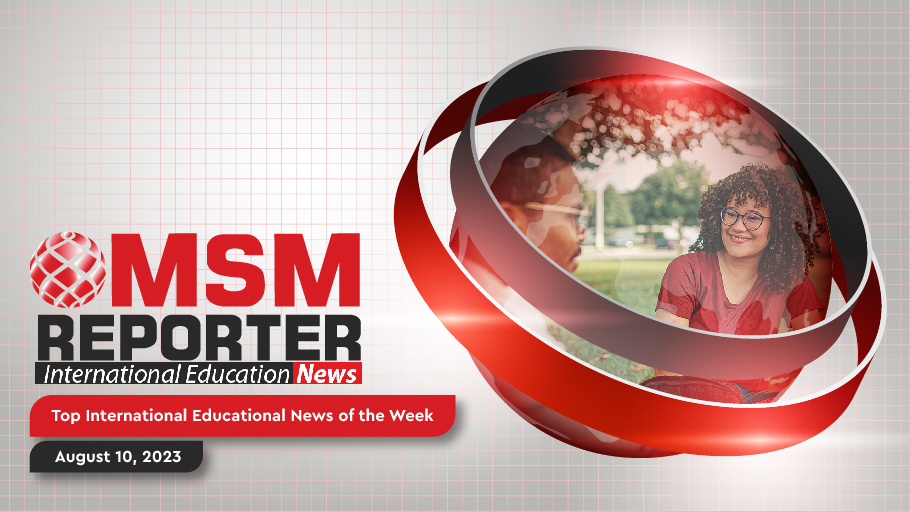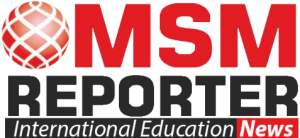
Note From the Editor
In the United States, a report revealed the stark reality of the likelihood of denials for students processing their F1 visas from countries within the Global South, with African countries experiencing the highest rejection rates, followed by those from Latin America, and the Caribbean, much of Asia, and Oceania. The report intends to bolster the need for evidence-based, decision-making in visa adjudication.
In the United Kingdom, top higher education institutions are tipping the scale by increasingly favoring international students over domestic applicants, reducing the opportunities for local students to secure admission. Concerns are building over this recent shift in prioritization.
All these key developments and more from Australia, Ireland, France and Russia in this week’s edition of MSM Reporter (Click for more international education news, insights, and resources).
A new report from the Presidents’ Alliance and Shorelight highlights the stark reality of visa denials for students from Global South countries aspiring to study in the United States. F-1 visa denials witnessed a significant global increase from 2015 to 2022, with African countries experiencing the highest rejection rates. The report aims to reinforce the need for evidence-based decision-making in visa adjudication. Stakeholders call for urgent action to address the disparities in visa outcomes and tap into the potential of these talented international students.
In a bid to address labor shortages and foster family integration, Canada introduces a new policy granting work permits to dependent children of temporary foreign workers (TFWs). The eligibility criteria encompass various family members, excluding TEER 4 and 5 jobs. The move is expected to open up opportunities for over 200,000 foreign workers’ families and bolster the Canadian workforce with untapped talent. To qualify, dependent children must meet age and marital status conditions, with potential opportunities for future family class sponsorship.
The United Kingdom’s top universities are increasingly favoring international students over domestic applicants, resulting in reduced chances for local students to secure admission. As inflation devalues the worth of local tuition fees, higher education institutions are turning to higher-fee-paying international students to offset losses. Concerns are mounting as prestigious universities shift their focus away from educating domestic students, leading to potential intervention demands from the government and financial losses estimated at £4,000 ($5,076.32) per undergraduate student. The number of international students in the UK has surged, with China leading the way, followed by India and Nigeria. Universities must now grapple with maintaining funds while addressing the high demand from 18-year-old students, who may be left without places.
Ireland experienced an unprecedented surge in residence permits issued to non-EU citizens, becoming one of the largest increases in the EU and reaching a record number. Eurostat’s latest data reveals that 85,793 permits were granted last year, a staggering 146% increase from the 34,935 issued in 2021. Education and employment were the primary reasons for the permits, making up nearly three-quarters of all permits issued. With this surge, Ireland secured the seventh position among all EU countries in terms of permit issuance, surpassing Sweden, Belgium, and Hungary.
Moroccan students shine at the prestigious Ecole Polytechnique in Paris, with an impressive 41 securing places out of 60 foreign students who passed the entrance exam. The renowned institution’s commitment to academic excellence and its global impact in science and engineering attract top talents worldwide. The success of Moroccan youth in gaining access to esteemed French engineering schools reflects the nation’s dedication to education and training, reinforcing its image as a fertile ground for promising individuals and a source of inspiration for young people globally.
Australia halts acceptance of TOEFL iBT English language tests for visa applications starting July 26. The move comes as the Educational Testing Service introduces an upgraded version of the test globally, aiming to provide a better user experience while maintaining high language proficiency standards. Other English language scores like IELTS, Pearson Test of English, and Cambridge English will still be accepted for visa applications. Applicants should note that certain subclasses may require specific test scores, and retakes are allowed for IELTS components, according to the official notification.
Te Pūkenga reports a faster-than-expected return of foreign students to its polytechnics, with around 4900 fulltime equivalent international students expected this year, up from 2800 last year. Pre-pandemic, New Zealand Polytechnics saw 11,000 fulltime equivalent international students in 2019. The rebound in enrolments exceeds forecasts, indicating a strong demand for New Zealand as an international study destination. While hospitality and tourism courses experienced a slight decline in international enrolments, business, IT, and health courses remain robust. Unitec-Te Pūkenga’s head of International market development, Don Sirimanne, shares positive signs of renewed demand from agents, especially from India, which has overtaken China as the main source of foreign students. Unitec expects total foreign student numbers to return to pre-pandemic levels by 2025.
Over 1.3 million Indian students study abroad, with the USA as their top choice and Canada as the second favorite. Despite the new National Education Policy 2020, which aims to curb brain drain, the number of students pursuing higher education abroad increased by 68% compared to last year. Currently, 337,000 students have already left for foreign studies this year. The Union Education Ministry plans to attract students back by allowing world-class foreign universities in Gujarat International Finance Tec-City (GIFT City) to offer courses without domestic regulations. Canada’s popularity as a study destination is on the rise, with 186,000 students choosing it last year, compared to just 100,000 in 2018.
Canada and Iceland inked a new Youth Mobility Arrangement, enabling Canadian and Icelandic youth aged 18 to 30 to work and travel in each other’s country for up to 12 months, with the potential for a second 12-month experience. Expected to be effective in 2024, the arrangement aims to boost international opportunities for Canadian youth and strengthen ties between the two nations. With a focus on people-to-people links and shared values, the agreement seeks to enrich the lives of youth by exposing them to new cultures and enhancing their job prospects. Canada is home to the largest population of Icelandic immigrants outside Iceland, with over 100,000 people of Icelandic origin living there. The International Experience Canada program will facilitate this opportunity.
Russian universities partner with Chinese counterparts as Ukraine war freezes ties with US and Europe. Chinese President Xi Jinping and Russian President Vladimir Putin agree to promote cooperation between universities. This pronounces growing bilateral trade and demand for specialists that can drive new programs. As Russia seeks to court Chinese students, China may import competitive disciplines from Russia. Despite Western criticism, the China-Russia educational ties deepen, driven by mutual trust and shared pressure from the West.
Turkish students are increasingly opting for Eastern European universities for affordable higher education, with Poland, Hungary, and Czechia being the top choices. Over the past three years, the number of Turkish students pursuing university education in Eastern Europe has surged by 70 percent. Tuition fees at universities in Central and Eastern Europe range from 2,000 to 7,000 euros ($2,200 to $7,600), making it an attractive option for fields like medicine, engineering, architecture, and psychology. Monthly expenses, excluding education costs, vary between 450 and 1,000 euros ($495 and $1,100). Italy also emerges as a preferred destination due to its scholarship system, offering eligible students free education and cash support scholarships of up to 7,000 euros ($7,770) annually.
Dubai emerges as a prominent higher education destination, drawing significant interest from Indian and global universities. With over 164,000 Indian students flocking to Dubai between 2021 and 2022, the city’s appeal continues to grow. Premier institutions like the University of Birmingham and Middlesex University have already set up base in Dubai, alongside several Indian universities. The UAE’s robust regulatory framework and strategic collaborations between international and regional institutions bolster its attractiveness. Dubai’s proximity, safety, quality of life, and career opportunities make it an ideal educational destination, solidifying its position as a thriving hub for higher education.
Established in 1888, Abertay University is a modern and friendly institution in Dundee, Scotland. Focused on teaching, it prepares graduates for the workforce while excelling in research and knowledge exchange. Renowned as a top UK tech university, Abertay’s video games education is unmatched, ranking number one in Europe for seven years. With three academic schools offering diverse programs and real-world work experience, students gain valuable skills.
The university takes pride in its inclusive and welcoming environment, being the 2021 Sunday Times University of the Year for Teaching Quality and ranking in the UK’s top 10 for Student Satisfaction. Abertay’s compact campus blends history with modern labs and research centers, shaping future leaders and innovators.
The Bachelor of Science in Computer Science at UNBC offers a versatile 120-credit program that can be completed in four years, accommodating both full-time and part-time students. It provides students with an opportunity to deep dive into programming, data mining, and cyber security. Students can enhance their skills with applied research and project courses while having the option to minor in other interesting programs.
With a strong focus on teaching, research, and the environment, UNBC offers exceptional undergraduate and graduate programs exploring diverse subjects like cultures, health, economies, and sciences. It also provides financial awards, benefiting one in four students. Students can enjoy an inclusive and supportive learning environment while contributing to a more sustainable future.


MSM Reporter is collated by a globally spread team of MSM and is published every Thursday.
Copyright © 2024 M Square Media. All Rights Reserved
This website uses cookies to assist to personalize content, analyze our traffic, and to assist with our promotional and marketing campaigns. We also share information about your use of our site with our social media, advertising, and analytics team who may combine it with other information that you’ve provided to them or that they’ve collected from your use of their services. For more information about your cookies and how to change your settings, refer to our Privacy Policy.